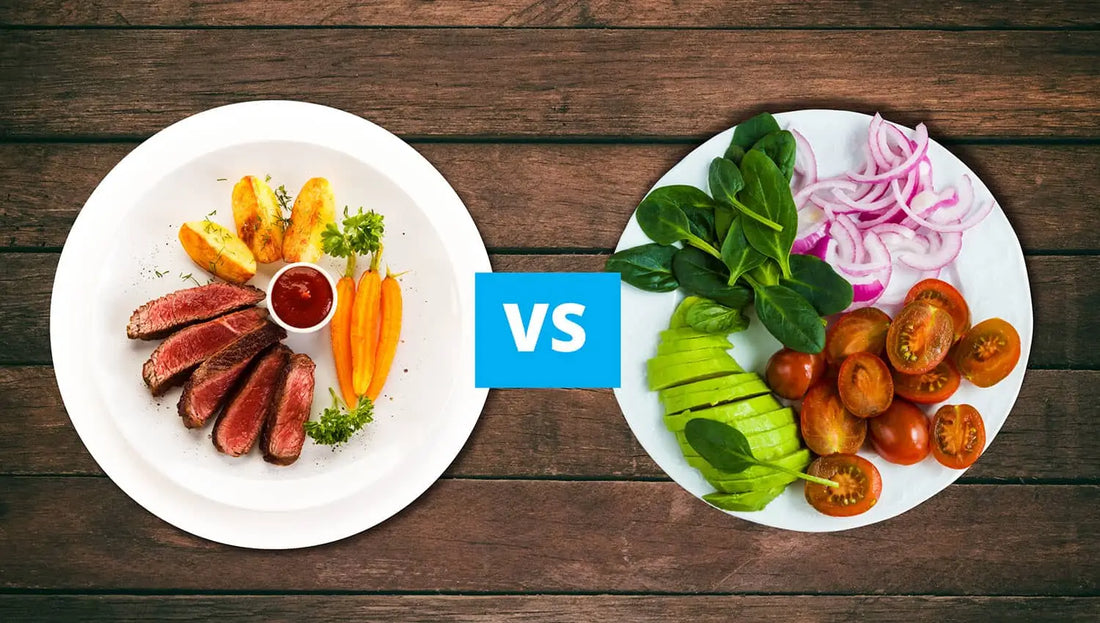
Plant-Based vs. High-Protein Diets: What’s Right for You?
Share
Plant-Based vs. High-Protein Diets: What’s Right for You?
Choosing a diet that supports your health and wellness goals can feel overwhelming with so many options available. Two popular approaches—plant-based diets and high-protein diets—each offer distinct advantages and challenges. Understanding the specifics of these diets can help you determine which aligns best with your individual needs, from managing blood sugar to supporting heart health.
Understanding Plant-Based Diets
Plant-based diets emphasize foods that come primarily from plants, such as fruits, vegetables, legumes, whole grains, nuts, and seeds. While a fully vegan diet excludes all animal products, many plant-based eating patterns allow for moderate consumption of dairy, eggs, or other animal-derived foods, focusing on minimizing animal intake and maximizing the variety and quantity of plant foods.
Benefits of Plant-Based Diets:
-
Improved Heart Health: Research consistently links plant-based diets to lower blood pressure, reduced cholesterol, and a decreased risk of heart disease. The abundance of fiber, antioxidants, and healthy plant compounds in these diets supports cardiovascular wellness.
-
Weight Management: Thanks to their high fiber content and nutrient density, plant-based foods can help you feel fuller for longer periods, supporting healthy weight loss or maintenance without the need for calorie counting.
-
Reduced Cancer Risk: Many plant foods are rich in phytochemicals and antioxidants that may help protect cells from damage, contributing to a lower risk of several cancers.
-
Improved Blood Sugar Control: Plant-based diets are known to help regulate blood sugar and insulin sensitivity, providing particular benefits for individuals with diabetes or those at risk for metabolic syndrome.
-
Better Gut Health: The diverse fibers in plant-based diets nourish beneficial gut bacteria, which play a crucial role in digestion, immunity, and overall health.
Considerations for Plant-Based Diets:
-
Nutrient Deficiencies: Adopting a plant-based diet requires attention to nutrients like vitamin B12, iron, calcium, and omega-3 fatty acids. These nutrients are less abundant in plant foods, so careful planning or supplementation may be necessary to avoid deficiencies.
-
Potential for Calorie Restriction: Because many plant-based foods are lower in calories, it’s important to ensure you’re consuming enough energy, especially if you have high activity levels or specific health needs.
-
Social Challenges: Adhering strictly to a plant-based diet can sometimes make dining out or attending social gatherings more challenging, requiring advance planning or flexibility.
Understanding High-Protein Diets
High-protein diets focus on increasing the proportion of daily calories from protein-rich foods such as lean meats, poultry, fish, eggs, dairy, legumes, and sometimes protein supplements. These diets are often chosen to support muscle growth, aid weight loss, or enhance athletic performance.
Benefits of High-Protein Diets:
-
Muscle Growth and Repair: Protein is essential for building and maintaining muscle tissue, which is particularly beneficial for athletes, active individuals, or those recovering from injury.
-
Increased Satiety: Protein-rich meals promote a lasting sense of fullness, which can help reduce overall calorie intake and support healthy weight management.
-
Improved Metabolism: Some studies suggest that digesting and metabolizing protein requires more energy than carbohydrates or fats, potentially giving a slight boost to metabolism and aiding weight loss.
-
Preservation of Muscle Mass During Weight Loss: Higher protein intake helps prevent muscle loss when reducing calories, supporting better body composition during weight management efforts.
Considerations for High-Protein Diets:
-
Kidney Strain: Elevated protein intake can place additional stress on the kidneys, especially for those with pre-existing kidney issues or risk factors for kidney disease.
-
Increased Risk of Certain Diseases: Some research has linked high consumption of animal-based proteins to higher risks of heart disease and certain cancers, although the evidence varies and is still being explored.
-
Nutrient Imbalances: Focusing primarily on protein can lead to insufficient intake of other vital nutrients, such as fiber, vitamins, and minerals, which are crucial for overall health.
-
Digestive Issues: Consuming large amounts of protein, particularly from animal sources, may result in digestive discomfort, bloating, or constipation in some individuals.
Plant-Based vs. High-Protein: Which is Right for You?
Choosing between plant-based diets and high-protein diets depends on your unique health status, goals, and lifestyle preferences. Consulting a registered dietitian or healthcare professional can ensure your choice supports your long-term wellbeing, helps manage blood sugar, and aligns with any existing health conditions such as heart disease or kidney concerns. Factors to weigh include:
-
Current Health Status: Existing medical conditions—like kidney disease or cardiovascular risk—may affect which dietary approach is safest and most effective for you.
-
Activity Level: Active individuals or athletes often require higher protein intake to support muscle repair and recovery.
-
Personal Preferences and Lifestyle: The best diet is one you feel comfortable maintaining over time, factoring in taste preferences, cultural traditions, and daily routines.
-
Dietary Restrictions or Allergies: Consider any food allergies or intolerances as you plan your diet to avoid nutritional gaps or adverse reactions.
The most important aspect is to prioritize a balanced, nutrient-rich eating pattern—whether you choose a plant-based diet, a high-protein approach, or a blend of both. Sustainable changes that fit your lifestyle and support your health are far more effective than extreme or short-term diets.